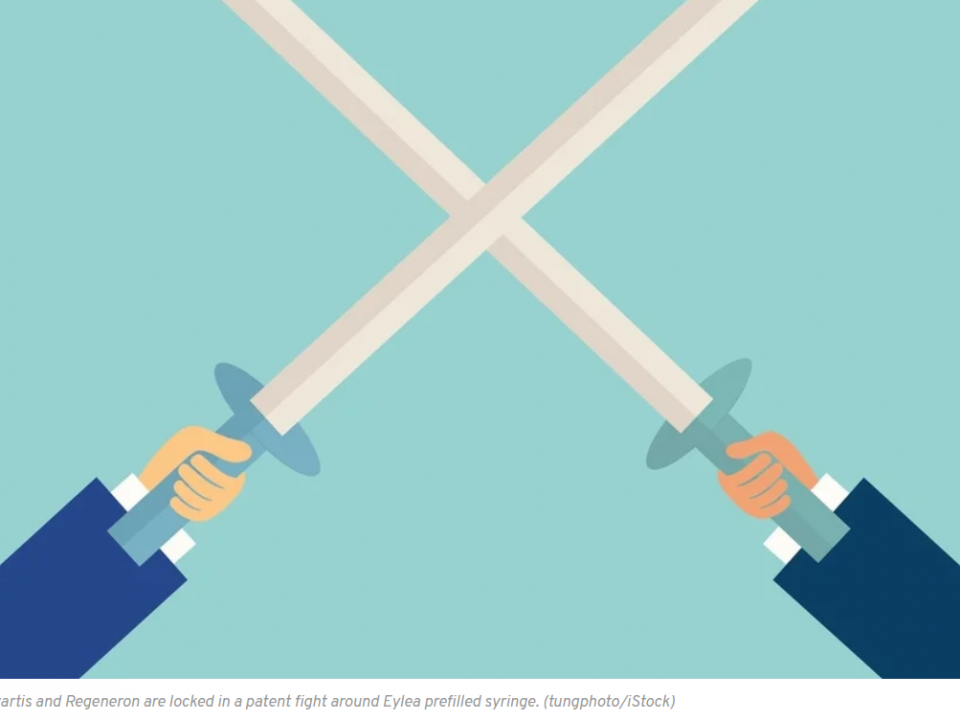- Intellectual Property Services
- +91-998-809-1807
- info@theipcrew.com
patent lawsuits
Regeneron’s prefilled Eylea syringe has gained fast traction since its introduction in late 2019. But the new delivery method for the eye med has drawn ire from Novartis, co-developer of rival Lucentis.
In a recent complaint filed at the U.S. International Trade Commission (ITC), Novartis alleged that Regeneron’s prefilled syringe tech infringed upon its patent and asked the agency to block imports of the competitor syringes, which are made in Germany. Separately, it has filed an infringement complaint in the Northern District of New York, seeking damages and marketing injunction.
The ITC, in a notice issued on Tuesday, said it has launched an investigation (PDF) into the case and required Regeneron to provide responses within 20 days.
But Regeneron isn’t playing sitting duck. The company has filed petitions before the U.S. Patent and Trademark Office, challenging the validity of the Novartis patent in question. Regeneron is also suing Novartis and Vetter Pharma for antitrust violations. Vetter is the exclusive filler for the Lucentis prefilled syringe and Regeneron’s collaborator on Eylea.
In its complaint filed before the Southern District court of New York, Regeneron says Novartis “fraudulently” secured the patent claiming a prefilled syringe containing “any anti-VEGF drug”—which also covers Eylea—by “deliberately withholding” material information from the USPTO.
Novartis is allegedly reached a settlement around the then-pending patent “to obtain control and influence over Vetter’s PFS filling services so as to inhibit anti-VEGF rivals like Regeneron,” Regeneron said. In what the New York company called a “quid pro quo,” Novartis stood to gain as Vetter agreed to “place onerous and anticompetitive restrictions on Novartis’ rivals,” and Vetter practically became the sole filler for all anti-VEGF prefilled syringe drugs.
RELATED: Pandemic hits Novartis sales with eye meds, Cosentyx suffering from slowdown
According to Regeneron, Vetter also pushed for a 20-year exclusive supply deal with Regeneron for the Eylea prefilled syringe as a condition for Novartis not suing it over the patent. But Regeneron declined, fearing Vetter’s “limited-supply” services and “certain quality concerns” would hurt its competitiveness in the eye disease market. It was therefore forced to create a new supply and filler chain for the Eylea prefilled syringe and launched in late 2019.
Since then, use of the prefilled syringe has reached about a 75% share of total Eylea use, Regeneron commercial chief Marion McCourt told investors during a conference call in May.
Novartis’ Roche-partnered Lucentis has long lagged Eylea in terms of sales; in 2019, Roche registered U.S. Lucentis sales of CHF 1.83 billion ($1.97 billion), way below Eylea’s $4.64 billion. Part of the reason is Eylea’s advantageous 12-week dosing schedule, while recommended Lucentis administration is once-monthly.
But Novartis recently won an FDA nod for rival med Beovu, doses of which can also be given 12 weeks apart; the drug is available as a vial, and Novartis is seeking clearance for a prefilled syringe. The new med could have been Novartis’ chance at really challenging Eylea in the U.S., but a new link to vision loss disrupted that plan, with Beovu sales crashing to merely $34 million in the second quarter.
It was after the safety red flag that Novartis filed the patent infringement complaint at the ITC, aiming to bar importation of the Eylea prefilled syringe into the U.S.
“Instead of competing on the merits, Novartis and Vetter have concocted numerous anticompetitive obstacles to initially try to stop Regeneron from launching—and now from selling—Eylea PFS,” Regeneron claims in its complaint.
Article Source: https://www.fiercepharma.com/pharma/novartis-regeneron-locked-acrimonious-eylea-prefilled-syringe-patent-fight

